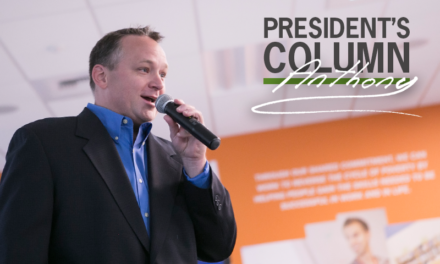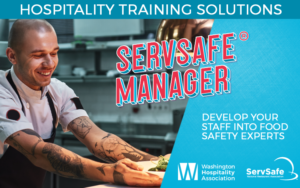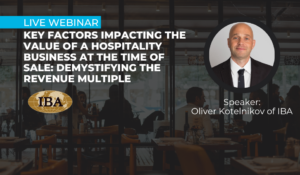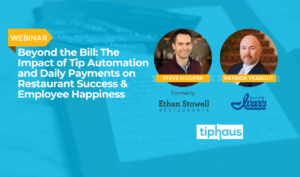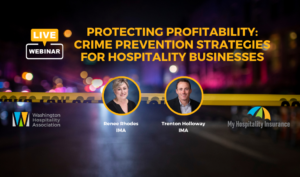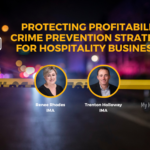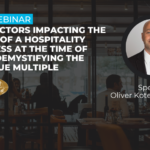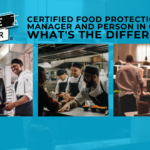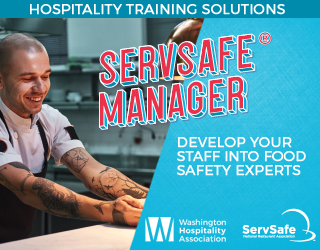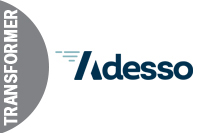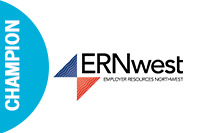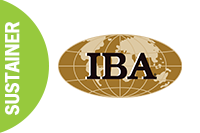By Paul Schlienz
Careers in the hospitality industry are often misunderstood.
“During the push to raise the minimum wage, in Seattle, I had city council members tell me that hospitality offers low paying, dead-end jobs,” said David Watkins, general manager of The Sound Hotel.
This is an all too common perception of hotels and restaurants, perhaps, but also one that distorts a much more positive truth: While there are entry-level jobs in hospitality, it is also an industry of opportunity where people can enter with limited skills, learn on the job and follow career pathways that can lead to very rewarding, long-term employment.
Low barriers to entry, transferable skills
“Hospitality has a low barrier entry point,” Watkins said. “People who have had challenging backgrounds and limited education have been able to enter into the industry because of their skills with their hands, skills with food, people skills, selling skills or accounting skills. They’ve been able to come in through entry-level positions and grow into a profession that provides a good living for many people.”
Hospitality is also an industry where people can pick up skills that are transferable to many other fields.
“Transferability is what makes our industry integral to the overall labor ecosystem,” said Brian Moreno, owner of a McDonald’s franchise in Othello. “Hospitality provides those early professional development skills – standard operating procedures, teamwork, professional communication, health and public safety and leadership. An individual in the hospitality industry experiences varying degrees of skills and skill levels from being a front-line team member to leading a large-scale organization, all of which are applicable in any field.”
A particularly spectacular example of someone who picked up transferable skills in the hospitality industry is Suzi LeVine, commissioner of the Washington State Employment Security Department (ESD) and former U.S. ambassador to Switzerland and Liechtenstein.
“I’ve had a very non-linear career, and over that time, a number of my jobs have been in hospitality,” LeVine said in a special video made to celebrate Hospitality Month 2019. “For example, my first job where I cut my teeth and learned how to work with customers was on the Atlantic City Boardwalk, making corn dogs at a walk-up restaurant called Dip Sticks.”
LeVine progressed in a hospitality career that eventually took her to the position of vice president of marketing and sales for luxury travel at Expedia, which she credits with teaching her how to best match the needs of customers with hospitality products.
Eventually, in 2014, she became a U.S. ambassador, and found the skills she learned in the hospitality industry contributed greatly to her job.
“A lot of my job was about opening up my home to receive guests whose conversations and convenings and fundamentally to understand and match the needs of different groups and/or individuals, especially given the protocol that we had to apply to all of those engagements,” LeVine says in her video. “It was the epitome of how to be hospitable. In other words, the world of hospitality has very much been my world and has helped shape how I do my work and engage with others.”
Telling our stories
LeVine is not the only person with a great hospitality story to tell. There are many success stories, both in the industry and outside, of people whose lives and careers have been greatly affected in positive ways by working in the hospitality industry.
With so much that is positive, the question is: Why has this industry had so much trouble changing its low wage, dead end job image?
“First, we need to own the perception,” Moreno said. “Both internal and external customers are pressuring us to change and pressure can, at times, be a good thing. We as owners have challenged ourselves to rethink the value proposition for someone wanting to work in our industry. We are more transparent about upward mobility, the opportunities to grow both personally and professionally, and enhancing our offerings like public/private partnerships with tuition reimbursement or grants at universities.”
Patrick Yearout, director of recruiting and training at Ivar’s, says hospitality employers need to do a better job of promoting their career ladders so new and prospective employees will know from the outset that there is real opportunity in the industry.
“When new people join your business, show them what their career ladder is,” Yearout said. “Show them what the potential jobs are. Talk to them about the different ways they can move up in the company if they’re interested in moving up or taking on more responsibility. Show them how they can do it. Give them concrete steps.”
Yearout uses Ivar’s as an example of how to communicate with new employees about career paths.
“The first step in our career ladder is to tell the employees, ‘If you’re interested in moving up, raise your hand and let us know. Talk to your supervisor or talk to your manager about what your goals are,’” Yearout said.
Getting employees to think about their future is essential, according to Yearout.
“In our training manual, on the very first page, the first question we ask employees when they start working for us is, ‘What would you like to accomplish with your career at Ivar’s?’ or ‘What would you like to contribute during your career at Ivar’s?’” Yearout said. “We ask those questions right up front to help understand what their goals are.”
Yearout also says hospitality employers have been too reticent in promoting the stories of people who have succeeded in the industry, starting at entry-level and growing into career positions as managers or executives.
“Promote your successes,” Yearout said. “When you do have somebody who moves up – say they go from hourly employee all the way to district manager – promote that as much as you can in your newsletter, in social media, at pre-shift meetings, wherever you can talk about it. Let everyone know. Let your employees know that there are people moving up that they can use as examples, meet them, talk to them and find out what they did to get where they are.”
Recruiting
It’s a challenge to find employees in a tight labor market, and it’s a double challenge when employers need to debunk false, but persistent negative images that have grown up around the industry.
One way to get the public to focus on the hospitality industry and the many positive things it has to offer was when Gov. Jay Inslee declared May to be Hospitality Month in 2017, 2018 and 2019.
“The biggest impact of Hospitality Month was to get people working in the industry, get people started in careers,” said Chad Pearson, outreach and strategic communications manager at ESD, who also has a long background of 20 years of working in hotels. “Hospitality Month is my favorite month of the year.”
ESD and the Washington Hospitality Association Education Foundation industry have partnered on job fairs and a microsite – WAHospitalityCareers.com – where hospitality employers can go to list job openings and job seekers can leave their résumés and search for positions.
“ESD has long existed at the intersection of industry and the public,” Moreno said. “It knows what it takes to create partnerships which result in meaningful outcomes for Washington’s constituents. It’s an incredible opportunity to partner with them and continue to move the needle for both our industry and our stakeholders.”
During Hospitality Month 2019, 100 people found work in the hospitality industry through the partnership between ESD and the Education Foundation.
“These partnerships work, and everyone puts in a lot of effort to make this happen,” Pearson said. “We’ve had several hiring events across the state that focused on hospitality jobs – everything from quick service restaurants to hotels and resorts. We’ve created videos to tell people’s stories about the hospitality industry, and we’ve educated the WorkSource system about hospitality.”
Spreading the word
Yearout cautions that, in recruiting people to the hospitality industry, many employers rely too heavily on help wanted signs and online ads.
“Those traditional avenues of advertising a job are good, and you’ll get some candidates, but I think it’s a lot more powerful if your employees help in the recruiting process,” Yearout said. “Make sure they understand what jobs are available and have them go out and tell their families and their friends. About 40 percent of new hires first find out about their job at Ivar’s from family or friends who already work for our company.”
Yearout considers Ivar’s employees to be the company’s most effective outreach to job seekers.
“We get a lot of referrals, and we rely on those referrals because our employees are our best recruiters,” Yearout said. “They understand the job, they know about the workplace and they know about the benefits. They can do a better job of telling our story than we could get across in an online ad or a help wanted sign or notice. We really rely on them.”
Ivar’s also provides a monetary incentive for employees who give referrals.
“We have a bounty program,” Yearout added. “We promote it and use it to encourage current employees to help us find new employees.”
Moreno says hospitality employers should embrace new ways of promoting themselves and the jobs they offer.
“We have to be prepared to change,” Moreno said. “Hospitality must recognize its role in the modern economy and be willing to innovate in trying circumstances. This is an opportunity to think differently about how we share our story, how we protect this legacy of being the best choice for first-time employment and how we continue to cultivate leadership by advancing our teams through the nearly limitless opportunities to grow in our industry.”






